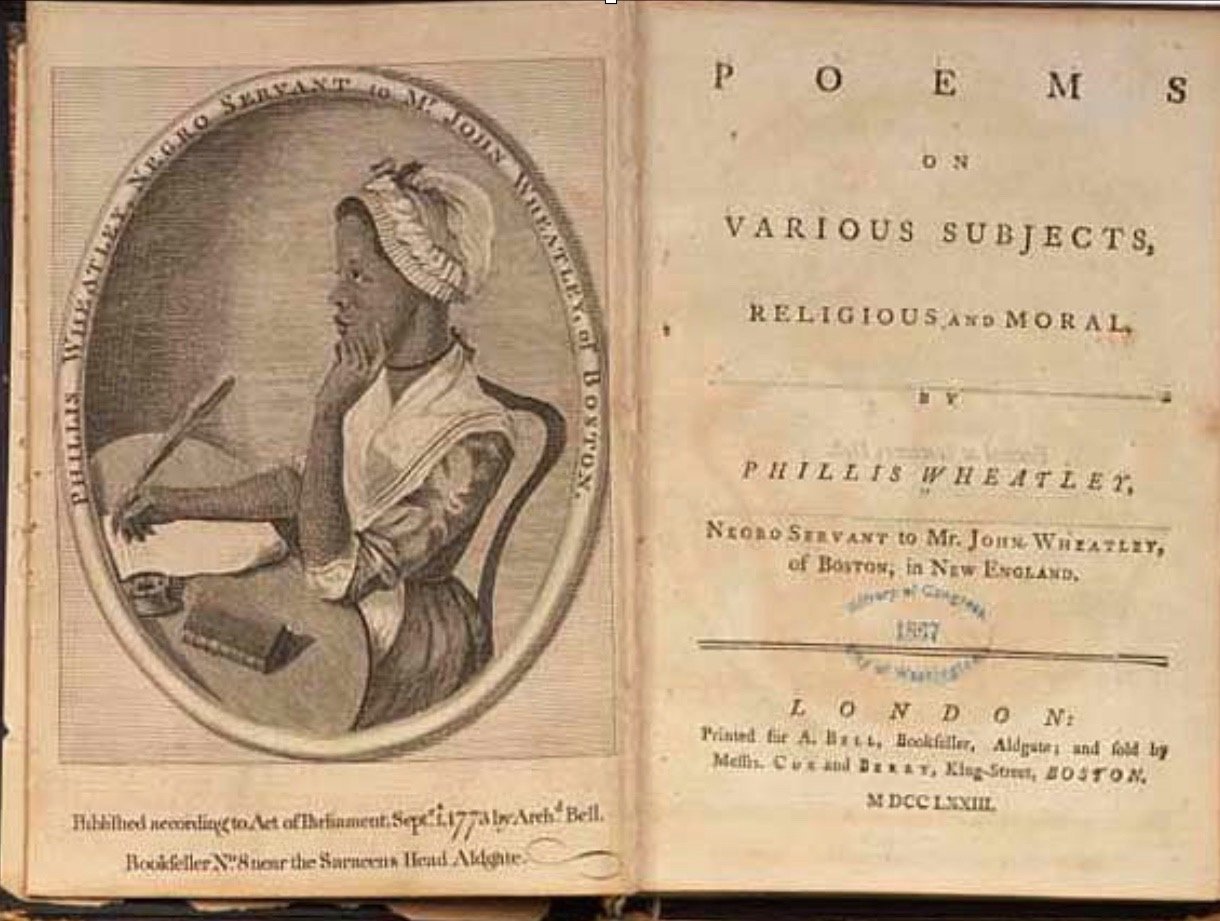Phillis Wheatley: An Example of Erudition
Subscribe to us on:
Phillis Wheatley was the fist African American to publish a book of poetry in the colonies—she lived before, during and through the American Revolution, from about 1753(?) to 1784.
The Middle Passage
Her story began in Africa where she was born. Shewas kidnapped when she was just seven or eight years old and placed on a slave ship. Imagine what it must have been like for her to be captured at such a young age and taken, probably by grown men, aboard a slave ship to America.
She was put on the slave ship the Phillis and experienced the Middle Passage through the eyes of a young child—about 25% of the enslaved Africans on that ship died before the boat reached New England.
Erudition and Learning
She arrived in Massachusetts in July of 1761 and was purchased by John and Susanna Wheatley. John Wheatley was a merchant in Boston.
They named her after the slave ship she was brought on and their last name, Wheatley, was adopted...so she eventually became known as Phillis Wheatley in her writings.
Phillis showed an interest in writing, early, and the Wheatley's supported her talents. She did not receive a formal education, but the support the family gave her in literature, Latin, and the Bible helped her develop.
She was able to do what many women were not able to do in the 1770s...she became an author.
John Wheatley wrote in a letter, dated November 14, 1772, of her talents and abilities:
"Phillis was brought from Africa to America; in the Year 1761,betweenSevenandEightYearsofAge. Withoutany Assistance from School Education, and by only what she was taught in the Family, she, in sixteen Months Time from her Arrival, attained the English Language, to which she was an utter Stranger before, to such a Degree, as to read any, the most difficult Parts of the Sacred Writings, to the great Astonishment of all who heard her.
As to her Writing, her own Curiosity led her to it; and this learnt in so short a Time, that in the Year 1765, she wrote a Letter to the Rev. Mr. Occom, the Indian Minister, while in England".
Phillis Wheatley also studied Latin and by the time she was about fourteen years old she published her first poem in a Rhode Island newspaper, the Newport Mercury, entitled: "On Messrs Hussey and Coffin," in 1767.
A Brilliant Move
Phillis also wrote poems about famous religious and colonial leaders, of that time. Her letter and poem to George Washington drew a response from him of thanks and respect for her talents.
She often wrote poems (elegies) about prominent leaders who died. This was a brilliant move, by her, since poems of this nature...written by a woman in slavery in the 1700s...might generate a good deal of interest and attention.
For instance she wrote a work entitled:
"An Elegiac Poem On the Death of that celebrated Divine, and eminent Servant of Jesus Christ, the Reverend and Learned Mr. George Whitefield”.
George Whitefield was a well-known Methodist minister who travelled through, and to, the American colonies. He was also the personal chaplain of a Countess in England—the Countess of Huntingdon, Selina Hastings. Mrs. Hastings, after this poem, took a personal interest in Phillis.
In 1773 Phillis travelled to London, with the Wheatley's son, hoping to meet Mrs. Hastings, but they were unable to meet in person. Mrs. Hastings did, however, support Phillis and in September of 1773 she helped Phillis publish her first book, Poems on Various Subjects, Religious and Moral.
This became the first published book of poetry by an African-American, in the colonies, and the friends she made in England encouraged John Wheatley to free Phillis later on that year.
Phillis Wheatley did not become a rich woman and her second volume of poetry was never published. She married John Peters, a free African-American man and they had three children, two of whom died early in life.
Phillis Wheatley left a legacy of erudition and dedication that should be remembered by children today.
This is an excerpt from Stories about Black History: Vols. 1 & 2, available on Amazon.
Copyright 2015, Danita Smith and Red and Black Ink, LLC
References:
AmericanTreasuresoftheLibraryofCongress. AVoiceofHerOwn. Phillis Wheatley. Accessed 4-2014. http://www.loc.gov/exhibits/treasures/ tri013.html, Accessed 4-2014. http://www.medfordhistorical.org/ medford-history/africa-to-medford/tomothy-fitch/
MassachusettsHistoricalSociety. AfricanAmericansandtheEndofSlavery. Phillis Wheatley. Accessed 4-2014. http://www.masshist.org/endofslavery/ index.php?id=57
America'sStoryfromAmerica'sLibrary. PhillisWheatley,theFirstAfrican American Published Book of Poetry, September 1, 1773. Accessed 4-2014.
http://www.americaslibrary.gov/jb/revolut/jb_revolut_poetslav_1.html
African American Odyssey. Individual Accomplishments: Phillis Wheatley's Love of Freedom. Accessed 4-2014. http://memory.loc.gov/ammem/aaohtml/ exhibit/aopart2.html#0215
Wheatley, Phillis. Poems on Various Subjects, Religious and Moral, 1773. Rare Book and Special Collections Division, Library of Congress.
Photos:
Wheatley, Phillis. Poems on Various Subjects, Religious and Moral, 1773. Rare Book and Special Collections Division, Library of Congress.
